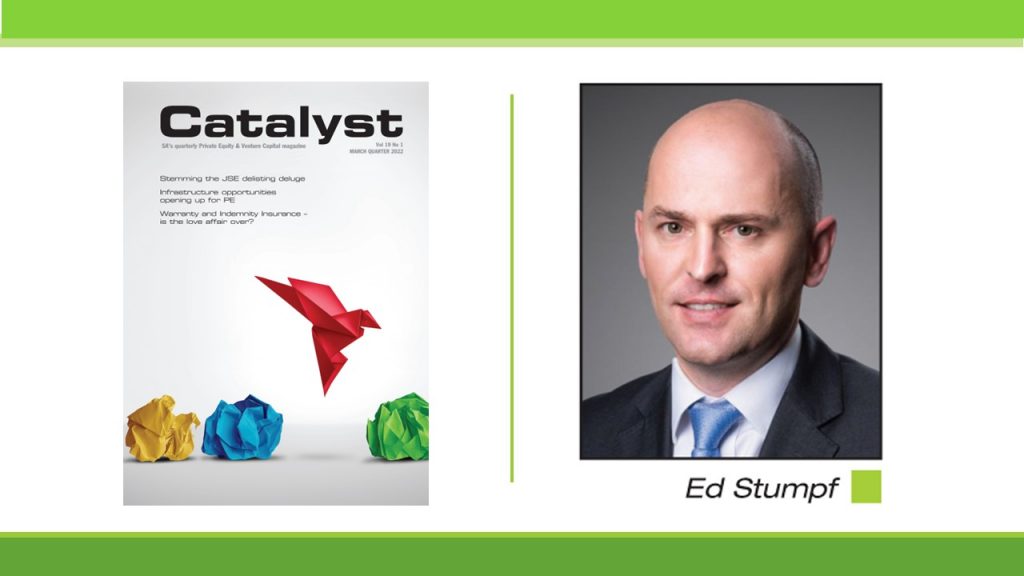While the opening up of South Africa’s monopoly network infrastructure continues to progress at mixed speeds and with uncomfortable teething problems, particularly on the broken track of third-party access to rail, private equity infrastructure funds continue to position for a new era of private sector participation.
As President Cyril Ramaphosa said at the government’s recent fourth Investment Conference, there is optimism “that the various infrastructure development projects such as construction of bulk water infrastructure, construction of new road networks, energy capacity expansion plans, improvement of our port infrastructure among others, present great opportunities for sustainable as well as inclusive growth.” This was in the context of the Economic Reconstruction and Recovery Plan – government’s economic blueprint unveiled by the President in 2020.
And make no mistake, the challenge is one so large that the country seems consumed by the new national question of whether South Africa is well on its way to becoming a failed state, if not already there.
According to The South African Property Owners Association, the root of the challenge remains firmly embedded at local government level, with aging infrastructure, poor maintenance regimes, excessive numbers of potholes, rampant corruption, poorly maintained pedestrian walkways, leaking water mains and sewers, collapsing water treatment plants, electricity shutdowns, crime, grime, failing substations, and cable theft – all of which result in the loss of trading income, the order of the day.
When viewed through a distant lens, the progress appears a little more encouraging – the first spectrum auction in 18 years; Eskom being unbundled, glacially, but still; and Transnet Freight Rail opening up the tracks to third parties for the first time in 163 years. A new State water utility is being considered to “lure” private funds, and expected to be operational in 2023; and SANParks, which manages South Africa’s 20 national parks, recently gave details of the more than 100 projects for which it is seeking public-private partnerships. And there is more on the list.
The bottom line is that turning points are often hard to spot in the fog of anger and multiple disappointing false dawns. Could this time really be different?
The smart money at African Infrastructure Investment Managers (AIIM) seems to think so.
Most recently, AIIM, one of Africa’s largest infrastructure-focused private equity fund managers, with US$2,6bn assets under management across the power, renewable energy, digital infrastructure, midstream energy and transport sectors, with operations in 19 African countries, and the Mokobela-Shataki consortium, completed a R1,6bn takeover of The Logistics Group (TLG). The integrated logistics company operates in Southern Africa, with services across port, rail, warehousing and digital transport logistics.
The transaction was financed by a mix of equity and debt financing. AIIM, through its flagship South African IDEAS Fund and AIIF4 Fund, acquired a 74% stake in TLG. The remaining 26% stake was acquired by strategic investment partners, the Mokobela-Shataki Consortium, sponsored by Moss Ngoasheng, founder and CEO of Safika Holdings, and Monhla Hlahla, former CEO of Airports Company South Africa and current Chairperson of Royal Bafokeng Holdings.
Adding TLG to the AIIM portfolio bolsters its transport strategy in southern Africa, helping to address capacity deficits from ports and inland transport. South Africa’s ports are some of the continent’s least efficient. Doubling efficiency could equate to halving the distance between the country’s main trading partners.
Investment in transport corridors running from strategic southern African ports will benefit from strong growth prospects for various bulk and break-bulk cargoes, such as battery metals, cementing the continent’s role as a key player in the global energy transition.
Ed Stumpf, Investment Director at AIIM, calls the deal “a rare opportunity” to acquire a multi-corridor player, while addressing regional capacity constraints in partnership with Transnet and other major operators in the region.
“We view TLG as the cornerstone for a regional ports and logistics platform which will pursue additional investments along a number of transport corridors.”
“Looking more broadly, this will help reduce transport costs, which can have a considerable impact on the price of goods, and catalyse trade regionally and beyond. Positioning the group to support multi-mode rail/road and backhaul cargo efficiency is a core part of our strategy to reduce carbon emissions as part of the journey to net zero.”
Investment to enhance the existing TLG terminals in Cape Town, Port Elizabeth and Durban will be pursued in partnership with Transnet National Ports Authority, while operational ramp-up of TLG’s businesses in Mozambique, Zambia and Namibia will be prioritised.
AIIM will also seek to develop bolt-on investment prospects in other key markets where it has portfolio investments and on-the-ground experience to ensure that TLG provides a comprehensive offering along diverse corridors to hinterland centres of production or demand, commencing in the Southern and East African region.
AIIM’s legal advisor was ENSafrica. Singular Consulting provided commercial advice and KPMG led on accounting and tax.

This article first appeared in Catalyst, DealMakers’ private equity magazine.
DealMakers is SA’s M&A publication
www.dealmakerssouthafrica.com



